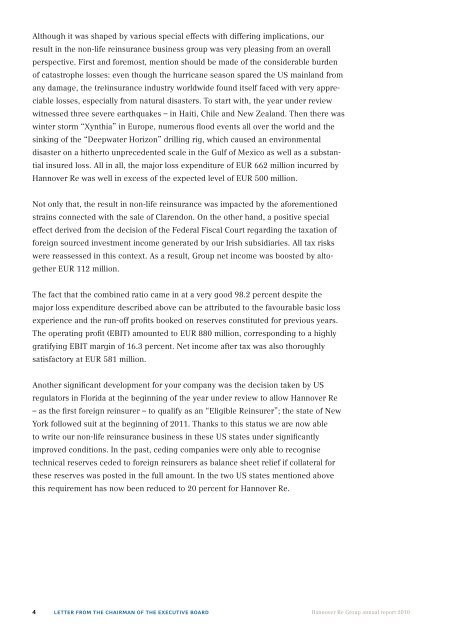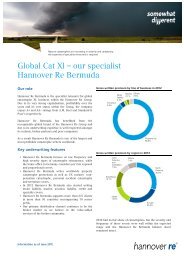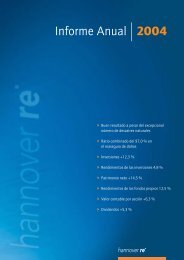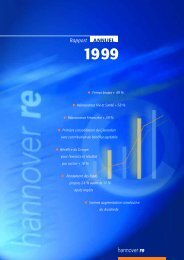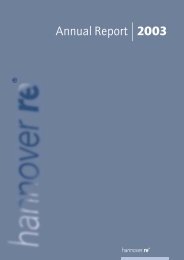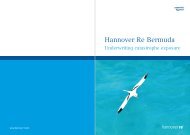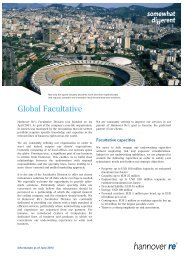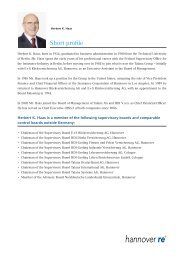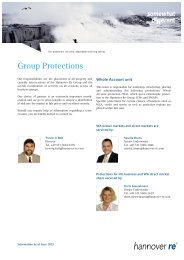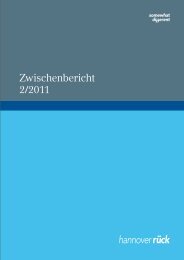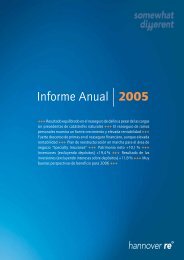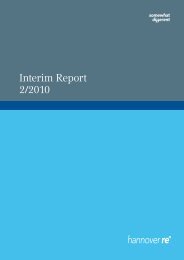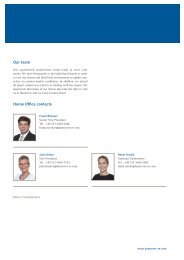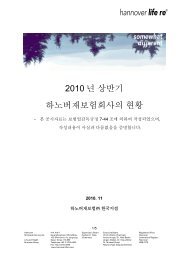Annual Report 2010 - Hannover Re
Annual Report 2010 - Hannover Re
Annual Report 2010 - Hannover Re
You also want an ePaper? Increase the reach of your titles
YUMPU automatically turns print PDFs into web optimized ePapers that Google loves.
Although it was shaped by various special effects with differing implications, our<br />
result in the non-life reinsurance business group was very pleasing from an overall<br />
perspective. First and foremost, mention should be made of the considerable burden<br />
of catastrophe losses: even though the hurricane season spared the US mainland from<br />
any damage, the (re)insurance industry worldwide found itself faced with very appreciable<br />
losses, especially from natural disasters. To start with, the year under review<br />
witnessed three severe earthquakes – in Haiti, Chile and New Zealand. Then there was<br />
winter storm “Xynthia” in Europe, numerous flood events all over the world and the<br />
sinking of the “Deepwater Horizon” drilling rig, which caused an environmental<br />
disaster on a hitherto unprecedented scale in the Gulf of Mexico as well as a substantial<br />
insured loss. All in all, the major loss expenditure of EUR 662 million incurred by<br />
<strong>Hannover</strong> <strong>Re</strong> was well in excess of the expected level of EUR 500 million.<br />
Not only that, the result in non-life reinsurance was impacted by the aforementioned<br />
strains connected with the sale of Clarendon. On the other hand, a positive special<br />
effect derived from the decision of the Federal Fiscal Court regarding the taxation of<br />
foreign sourced investment income generated by our Irish subsidiaries. All tax risks<br />
were reassessed in this context. As a result, Group net income was boosted by altogether<br />
EUR 112 million.<br />
The fact that the combined ratio came in at a very good 98.2 percent despite the<br />
major loss expenditure described above can be attributed to the favourable basic loss<br />
experience and the run-off profits booked on reserves constituted for previous years.<br />
The operating profit (EBIT) amounted to EUR 880 million, corresponding to a highly<br />
gratifying EBIT margin of 16.3 percent. Net income after tax was also thoroughly<br />
satisfactory at EUR 581 million.<br />
Another significant development for your company was the decision taken by US<br />
regulators in Florida at the beginning of the year under review to allow <strong>Hannover</strong> <strong>Re</strong><br />
– as the first foreign reinsurer – to qualify as an “Eligible <strong>Re</strong>insurer”; the state of New<br />
York followed suit at the beginning of 2011. Thanks to this status we are now able<br />
to write our non-life reinsurance business in these US states under significantly<br />
improved conditions. In the past, ceding companies were only able to recognise<br />
technical reserves ceded to foreign reinsurers as balance sheet relief if collateral for<br />
these reserves was posted in the full amount. In the two US states mentioned above<br />
this requirement has now been reduced to 20 percent for <strong>Hannover</strong> <strong>Re</strong>.<br />
4 Letter from the Chairman of the Executive Board<br />
<strong>Hannover</strong> <strong>Re</strong> Group annual report <strong>2010</strong>


